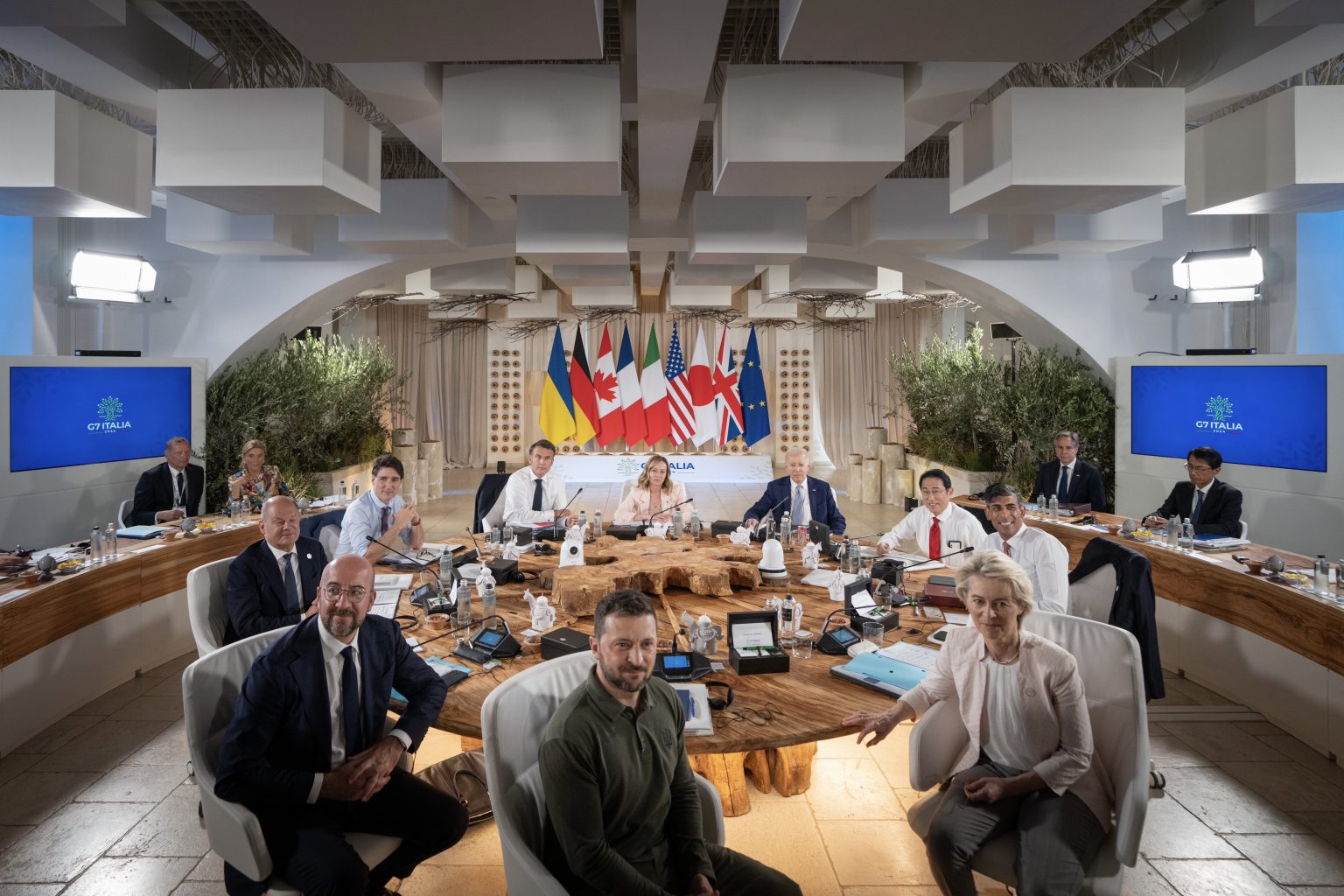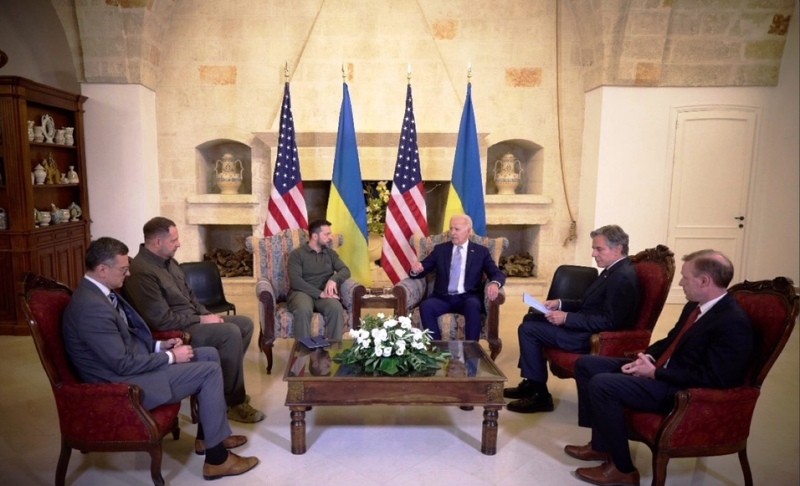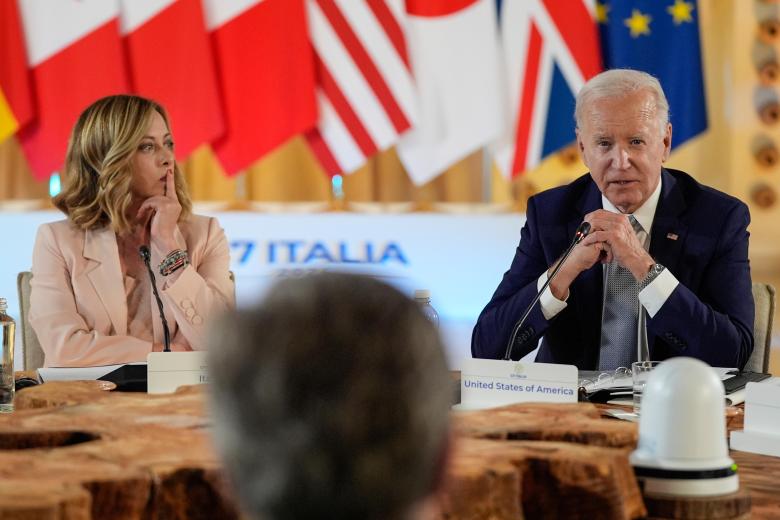How should this week’s G7 meeting in Italy be seen? The messages agreed upon and sent to absent Russia and China are forceful. The war in Ukraine, the war in Gaza-Israel, the rising conflicts with China loom with generational consequences. How should these G7 communiqué-warnings sent by ‘the West’ to ‘the East’ be seen?
Throwing down the gauntlet (or Walking the gauntlet)
The G7 member states of Canada, France, Germany, Italy, Japan, the UK, and the US, joined by the President of the European Council and President of the European Commission delivered a message to Russia and China. The messages from the G7 meeting in Italy can be put in a challenging, old world term — the glove is thrown, it is a gauntlet
Russia and China are challenged, formally, officially, financially, and militarily
Nations are put on notice…
G7 leaders’ communiqué
Russia’s aggression against Ukraine
The G7 leaders reiterated their unwavering support and their condemnation of Russia’s blatant breach of international law. “We are standing in solidarity to support Ukraine’s fight for freedom and its reconstruction for as long as it takes.”
In the presence of President Zelenskyy , the G7 leaders decided to make available approximately USD 50 billion, leveraging the extraordinary revenues of the immobilised Russian sovereign assets.
$50 billion additional funding to Ukraine stemming from the immobilisation of Russian sovereign assets.
Middle East and Gaza
G7 leaders’ communiqué
We are united in supporting the comprehensive deal that has been put forward that would lead to an immediate ceasefire in Gaza, the release of all hostages, and a credible pathway towards peace that leads to a two-state solution.
The G7 leaders reiterated their condemnation of the terrorist attacks conducted by Hamas and other terrorist groups against Israel on 7 October 2023.
The G7 recalled that, in exercising its right to defend itself, Israel must fully comply with its obligations under international law in all circumstances.
Leaders urged all parties to facilitate rapid and unimpeded passage of humanitarian relief for civilians in need, in particular women and children.
The G7 leaders reiterated their commitment to the vision of the two-state solution where two democratic states, Israel and Palestine, live side by side in peace within secure and recognised borders, consistent with international law and relevant UN resolutions, and in this regard emphasise the importance of unifying the Gaza strip with the West Bank under the Palestinian Authority.
Indo-Pacific
G7 leaders’ communiqué
The G7 seeks constructive and stable relations with China and recognises the importance of China in global trade.
We are not trying to harm China or thwart its economic development, indeed a growing China that plays by international rules and norms would be of global interest.
We are acting together to promote economic resilience, confront non-market policies and practices that undermine the level playing field and our economic security, and strengthen our coordination to address global overcapacity challenges.
Leaders discussed issues related to the Indo-Pacific region, which is subject to rising tensions and geopolitical competition, while reiterating their commitment to a free and open Indo-Pacific.
“We reiterate our commitment to a free and open Indo-Pacific based on the rule of law is inclusive, prosperous, and secure, grounded on sovereignty, territorial integrity, peaceful resolution of disputes, fundamental freedoms, and human rights.”
G7 countries are “de-risking and diversifying supply chains where necessary and appropriate, and fostering resilience to economic coercion”.
Economic security
The G7 leaders discussed global trade and the preservation of a level playing field, as well as how to reduce dependencies and respond to non-market policies and practices and harmful overcapacities.
Energy, climate, environment
The G7 reiterated its determination to address the triple global crises of climate change, pollution, and biodiversity loss.
Africa and sustainable development
The G7 leaders expressed their commitment to stepping up their support to African countries.
Migration
G7 leaders discussed addressing the ongoing migration pressure, which is one of the main priorities of the Italian G7 presidency.
We are affirming our collective commitment and enhanced cooperation to address migration, tackle the challenges and seize the opportunities that it presents, in partnership with countries of origin and transit.
The G7 leaders will focus on the root causes of irregular migration, efforts to enhance border management and curb transnational organised crime, and safe and regular pathways for migration.
The G7 also launched the G7 coalition to prevent and counter the smuggling of migrants.
Artificial intelligence
The G7 is committed to promoting safe, secure, and trustworthy AI.
We are deepening our cooperation to harness the benefits and manage the risks of artificial intelligence.
The G7 will launch an action plan on the use of AI in the world of work and develop a brand to support the implementation of the international code of conduct for organisations developing advanced AI systems.




Meanwhile… shifting away from the past, the G7’s point of view, and moving ahead into the future…
In an increasingly multilateral world, what about the BRICS and the Global South? It’s time to ask about additional perspectives in a world of new alliances, fast developing countries, regions, population centers, economies, and alternatives to advanced nations and western power.
Geopolitics — The Crisis Group provides talking points:
Summit Meeting in Switzerland
High-ranking officials from around the world convene in Switzerland for talks aimed at “inspiring a future peace process” in Ukraine
The Crisis Group lays out the Summit organisers’ goals and the obstacles
June 15-16
How have major non-Western powers responded to the Summit?
Ukrainian officials have worked assiduously to attract participants to the Summit (Switzerland invited 160 states to attend, leaving out only those, such as Venezuela and Nicaragua, that firmly back Russia). President Zelenskyy has lobbied other leaders personally to attend, visiting Singapore, the Philippines and Qatar in early June to drum up support for the event among Asian countries.
This charm offensive has run into obstacles. The turnout of European and Latin American states in Switzerland will be good, but the showing from Africa and Asia seems to be meagre. The Summit may even have had the unintended consequence of pushing hefty non-Western powers toward Moscow. One of Ukraine’s main goals for Bürgenstock was that China participate, given Beijing’s global clout and critical importance in sustaining Moscow’s war effort through growing trade. While clearly supporting Moscow, Beijing has hedged its position in prior pronouncements on the war, and China’s envoy for the Russian-Ukrainian war, Li Hui, joined the Jeddah national security advisers’ session on the peace formula in August 2023. Ukrainian officials laboured for months to secure China’s attendance at Bürgenstock, with the first deputy foreign minister traveled to Beijing in a last-ditch effort on 5 June. Yet China announced that it would not even send a lower-ranking delegate to Switzerland if Russia is not invited.
Zelenskyy has accused Chinese officials of lobbying other states to do the same – statements that are unlikely to build bridges with Beijing.
China also appears to have revised its public stance on the war.
In mid-May, Presidents Vladimir Putin and Xi Jinping signed a new partnership declaration in Beijing that called for a rapid end to the war, stressing the need for Western countries to respect Russia’s security interests but making no mention of Ukraine’s territorial integrity. Shortly afterward, China and Brazil – the current chair of the G20 – released a six-point set of “common understandings” on the “political settlement of the Ukrainian crisis” that called for “an international peace conference held at a proper time that is recognised by both Russia and Ukraine” and again contained no reference to Ukrainian territorial integrity and sovereignty.
While this statement was not entirely surprising – Brazilian President Ignacio Lula da Silva has frequently criticised U.S. and NATO policy on the war – it added to Ukrainian officials’ concerns that Russia and China might convince significant non-Western countries to back a peace proposal to counter Zelenskyy’s formula, one that would more or less openly affirm Russia’s right to hold on to the territory it is has seized. Brazil and South Africa are only sending relatively low-level delegations to the event and Saudi Arabia, previously seen as diplomatically helpful to Ukraine but as of 2024 a new member of the BRICS club, has decided not to attend at all. The BRICS foreign ministers met this week and released a statement that made only passing reference to Ukraine, suggesting the bloc has yet to reach a common view of the war. But it is evident that an important segment of the so-called Global South is also distancing itself from Ukraine and its backers.
Does the summit have any real bearing on the chances of peace?
Absent a major surprise on the Bürgenstock, the Summit on Peace for Ukraine is unlikely to deliver much of consequence. Ukraine and Russia already have channels for discussing certain discrete issues on the table, including food exports, prisoner exchanges and children. The International Atomic Agency has been involved in talks about nuclear security questions throughout the war. Ukraine may follow up on the Swiss summit by tabling a UN General Assembly resolution on the security of nuclear sites, but that step is unlikely to change the facts on the ground. Some officials who facilitate Russian-Ukrainian contacts worry that the summit will complicate the two countries’ limited cooperation in such matters, by politicising what have been lower-profile issues to date. In the meantime, Ukrainian officials are more concerned with the possibility of new Russian offensives and the outcome of the July NATO summit in Washington – where they hope to make progress toward membership in the alliance – than with what emerges from Bürgenstock.
Nonetheless, the Swiss summit is a chance for Ukraine and its allies to underline what the UN General Assembly recognised in 2022 and repeated in its February 2023 resolution on a just peace in Ukraine: Russia’s all-out aggression is a blatant violation of international law. As the war grinds on, many non-Western governments that expressed support for Ukraine have become preoccupied with other concerns, from international debt levels to the war in Gaza, where Western support for Israel is the source of great frustration. This meeting is a fresh opportunity, however fleeting, to bring the focus back to Ukraine and acknowledge what is at stake there, in terms of both escalation risks and the threat to the core principles of international law – sovereignty, territorial integrity and non-aggression – that Russia’s behavior has ruthlessly undermined.
More:
Joint Communiqué on a Peace Framework Switzerland
15-16 June 2024
The ongoing war of the Russian Federation against Ukraine continues to cause large-scale human suffering and destruction, and to create risks and crises with global repercussions for the world. We gathered in Switzerland on 15-16 June 2024 to enhance a high-level dialogue on pathways towards a comprehensive, just and lasting peace for Ukraine. We reiterated resolutions A/RES/ES-11/1 and A/RES/ES-11/6 adopted at the UN General Assembly and underscored our commitment to upholding International Law including the United Nations Charter.
This Summit was built on the previous discussions that have taken place based on Ukraine’s Peace Formula and other peace proposals which are in line with international law, including the United Nations Charter.
We deeply appreciate Switzerland’s hospitality and its initiative to host the High-Level Summit as expression of its firm commitment to promoting international peace and security.
We had a fruitful, comprehensive and constructive exchange of various views on pathways towards a framework for a comprehensive, just and lasting peace, based on international law, including the United Nations Charter. In particular, we reaffirm our commitment to refraining from the threat or use of force against the territorial integrity or political independence of any state, the principles of sovereignty, independence, and territorial integrity of all states, including Ukraine, within their internationally recognized borders, including territorial waters, and the resolution of disputes through peaceful means as principles of international law.
We, furthermore, have a common vision on the following crucial aspects:
1) Firstly, any use of nuclear energy and nuclear installations must be safe, secured, safe-guarded and environmentally sound. Ukrainian nuclear power plants and installations, including Zaporizhzhia Nuclear Power Plant, must operate safely and securely under full sovereign control of Ukraine and in line with IAEA principles and under its supervision.
Any threat or use of nuclear weapons in the context of the ongoing war against Ukraine is inadmissible.
2) Secondly, global food security depends on uninterrupted manufacturing and supply of food products. In this regard, free, full and safe commercial navigation, as well as access to sea ports in the Black and Azov Seas, are critical. Attacks on merchant ships in ports and along the entire route, as well as against civilian ports and civilian port infrastructure, are unacceptable.
Food security must not be weaponized in any way. Ukrainian agricultural products should be securely and freely provided to interested third countries.
3) Thirdly, all prisoners of war must be released by complete exchange. All deported and unlawfully displaced Ukrainian children, and all other Ukrainian civilians who were unlawfully detained, must be returned to Ukraine.
We believe that reaching peace requires the involvement of and dialogue between all parties. We, therefore, decided to undertake concrete steps in the future in the above-mentioned areas with further engagement of the representatives of all parties.



